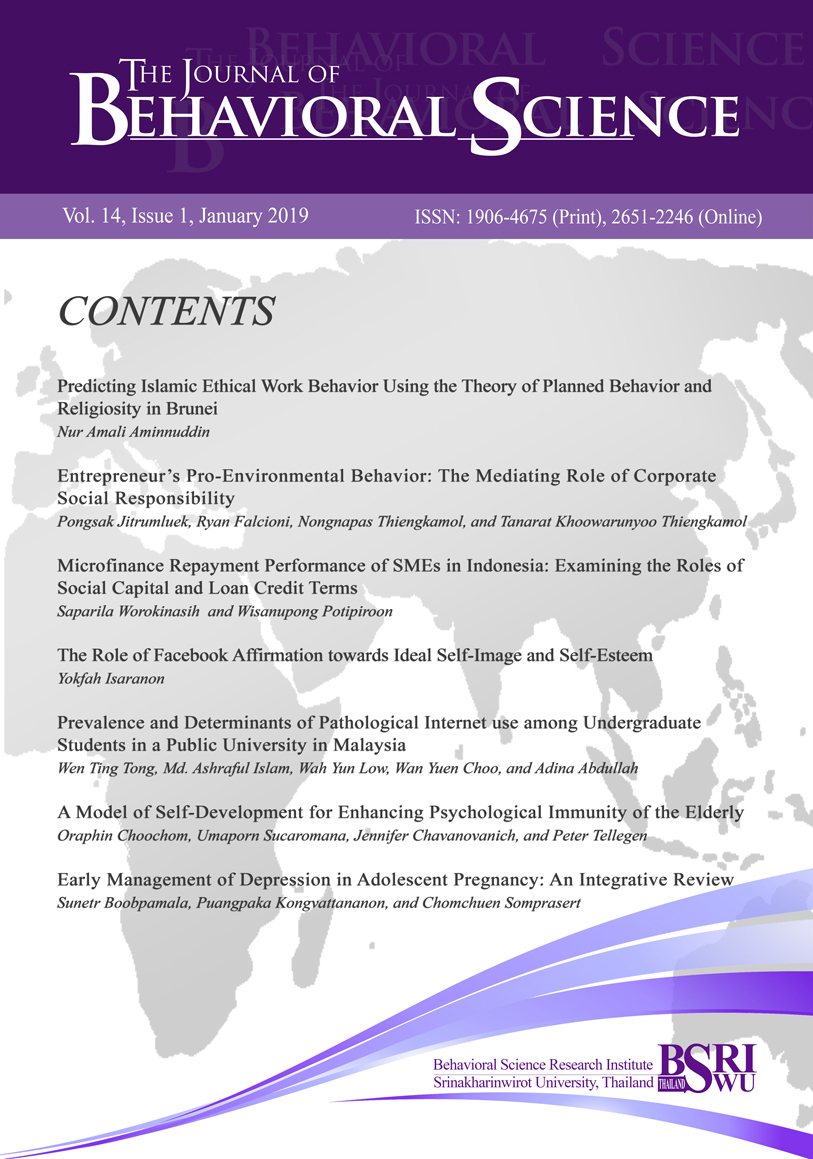Model of Self-Development for Enhancing Psychological Immunity of the Elderly
Main Article Content
Abstract
The purpose of this study was to examine the effectiveness of a self-development intervention for enhancing psychological immunity of the elderly. The psychological immunity intervention (PI) was based on an integration of mindfulness, self-efficacy, and optimism approaches. The study was a quasi-experimental design, including pre-test and post-test with a control group. The sample was recruited from senior clubs in Bangkhunthian District, Bangkok, Thailand. Participants were divided into 2 groups. The intervention group (24 participants) participated in the PI intervention activities, and the control group (24 participants) did not receive any intervention. The PI intervention consisted of 10 sessions for 5 weeks which lasted for two hours per session. Participants from both groups completed the questionnaire at the beginning and at the end of the intervention. The results showed that participants in the PI intervention group scored significantly higher on psychological immunity (F(1, 43) = 15.04, p < .01, partial eta-squared = .26) and psychological well-being (F(1, 44) = 23.33, p < .01, partial eta-squared = .35) than did the control group. More specifically, participants receiving the PI intervention showed significantly greater psychological immunity in the domains of resilience, mindfulness, and hope than did the control group. The findings suggest that the intervention was beneficial for the elderly and senior clubs to improve psychological immunity and well-being. The study provides implications for enhancing psychological immunity from a behavioral science approach.
Downloads
Article Details
References
Brown, K. W., Ryan, R. M., & Creswell, J. D. (2007). Theoretical foundations and evidences for its salutary effects. Psychological Inquiry, 18(4), 211-217. doi: 10.1080/10478400 70159 8298
Choochom, O. (2013). Kānphatthanā bǣp wat phūmkhumkan ton [The development of a self-immunity scale]. Warasan Chittawitthaya Mahawitthayalai Kasem Bandit, 3(3), 10-20.
Choochom, O. (2014). Antecedents and consequences of psychological immunity. Humanities and Social Sciences Review, 3(3), 191-197.
Diener, E., & Biswas-Diener, R. (2008). Happiness: Unlocking the mysteries of Psychological wealth. Malden, MA: Blackwell.
Felten, B., & Hall, J. (2001). Conceptualizing resilience in women older than 85: Overcoming adversity from illness of loss. Journal of Gerontological Nursing, 27(1), 46-54.
Fitzgeral, S., & Schutte, N. S. (2010). Increasing transformational leadership through enhancing self-efficacy. Journal of Management Development, 29(5), 495-505.
doi: 10.1108/02621 711011039240
Foundation of Thai Gerontology Research and Development Institute. (2016). Sathānakān phū sūngʻāyu Thai Phō̜.Sō̜. sō̜ngphanhārō̜ihāsipkāo [Situation of the Thai Elderly, 2016]. Bangkok: Foundation of Thai Gerontology Research and Development Institute.
Kabat-Zinn, J. (2003). Mindfulness-based interventions in context: Past, present, and future. Clinical Psychology: Science and Practice, 10(2), 144–156. doi: 10.1093/clipsy.bpg 016
Kansuntisukmongkol, K. (2017). Philosophy of sufficiency economy for community-based adaptation to climate change: Lessons learned from Thai case studies. Kasetsart Journal of Social Sciences, 38(1), 56-61. doi: 10.1016/j.kjss.2016.03.002
Keng, S., Smoski, M. J., & Robins, C. J. (2011). Effects of mindfulness on psychological health: A review of empirical studies. Clinical Psychology Review, 31, 1041-1056. doi: 10.1016/ j.cpr.2011.04.006
Larzarus, R. S., & Folkman, S. (1984). Stress, appraisal, and coping. New York: Springer.
Lei, P., Xu, L., Nwaru, B. I., Long, Q., & Wu, Z. (2016). Social networks and health-related quality of life among Chinese old adults in urban areas: Results from 4th National Household Health Survey. Public Health, 131, 27–39. doi: 10.1016/j.puhe.2015.10.009
Li, C., Jiang, S., Li, N., & Zhang, Q. (2017). Influence of social participation on life satisfaction and depression among Chinese elderly: Social support as mediator. Journal of Community Psychology, 46(3), 345-355. doi: 10.1002/jcop.21944
MacLeod, S., Musich, S., Hawkins, K., Alsgaard, K., & Wicker, E. R. (2016). The impact of resilience among older adults. Geriatric Nursing, 37(4), 266-272. doi: 10.1016/j.geri nurse.2016.02.014
Nithiuthai, S., Jinnge, P., & Choochom, O. (2017). Kān sangkhro̜ rūpbǣp kānčhatkān khwāmkhrīat nai phāwa wikrit chīwit khō̜ng phū sūngʻāyu [A synthesis of stress management of life crisis for older adults]. Journal of Behavioral Science for Development, 9(2), 73-92. doi: 10.144 56/jbsd.2017.20
National Elderly Committee. (2009). The 2nd National Elderly Plan (2002-2021). Bangkok: Ministry of Social Development and Human Security.
Nyklicek, I., Dijksman, S. C., Lenders, P. J., Fonteljn, W. A., & Koolen, J. J. (2014). A brief mindfulness based intervention for increase in emotional well-being and quality of life in percutaneous coronary intervention (PCI) patients: The mindful Heart randomized controlled trial. Journal of Behavioral Medicine, 37(1), 135-144. doi: 10.1007/s10865-012-9475-4
Office of National Economic and Social Development Board. (2017). The twelfth economic and social development plan (2017-2021). Bangkok: Office of National Economic and Social Development Board.
Olson, E. A., & McAuley, E. (2015). Impact of a brief intervention on self-regulation, self-efficacy and physical activity in older adults with type 2 diabetes. Journal of Behavioral Medicine, 38(6), 886-898. doi: 10.1007/s10865-015-9660-3
Rachman, S. J. (2016). Invited essay: Cognitive influences on the psychological immune system. Journal of Behavior Therapy and Experimental Psychiatry, 53, 2-8. doi: 10.1016/j.jbtep. 2016.03.015
Seligman, M. E. P. (1998). Learned optimism. NY: Free Press.
Seligman, M. P., Steen, T. A., Park, N., & Peterson, C. (2005). Positive psychology progress. American Psychologist, 60(5), 410-421. doi: 10.1037/0003-066X.60.5.410
Sergeant, S., & Mongrain, M. (2014). An online optimism intervention reduces depression in pessimistic individuals. Journal of Consulting and Clinical Psychology, 82(2), 263-274. doi: 10.1037/a0035536
Shapira, L. B., & Mongrain, M. (2010). The benefits of self-compassion and optimism exercises for individuals vulnerable to depression. The Journal of Positive Psychology, 5(5), 377-389. doi: 10.1080/17439760.2010.516763
Sun, Y., Zhang, D., Yang, Y., Wu, M., Xie, H., Zhang, J., … Su, Y. (2017). Social support moderates the effects of self-esteem and depression on quality of life among Chinese rural elderly in nursing homes. Archives of Psychiatric Nursing, 31(2), 197-204. doi: 10.1016/ j.apnu.2016.09.015
Snyder, C. R., Harris, C., Anderson, J. R., Holleran, S. A., Irving, L. M., Sigmon, S. T., …Harney, P. (1991). The will and the ways: Development and validation of an individual-differences measure of hope. Journal of Personality and Social Psychology, 60(4), 570-585. doi: 10.1037/0022-3514.60.4.570
Thera, N. (2014). The heart of Buddhist meditation: The Buddha's way of mindfulness. San Francisco, CA: Weiser Books.


